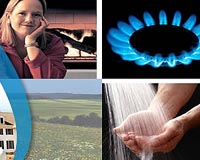 |
Baghdad (AFP) Dec 12, 2009 Iraq on Saturday awarded oil contracts to foreign giants at an auction it hopes will hike output to 12 million barrels a day and put it on a par with the world's top producer Saudi Arabia. Baghdad sold Russian firm Lukoil rights to one of the world's biggest untapped oil fields on the auction's second day, after striking deals with Anglo-Dutch company Shell, China's CNPC and Malaysia's Petronas on Friday. "This represents a victory," Oil Minister Hussein al-Shahristani told reporters at the end of the sale. "The fortune will not be spent on wars as it used to be." The money generated would "be for the Iraqi people -- we will not share it with anyone. We in the ministry are very happy with what we have achieved for Iraq," he said. Deals reached at the two-day auction would boost Iraq's oil production by more than 4.7 million barrels per day (bpd) over the next several years, from the current 2.5 million bpd. But Shahristani said the war-torn country's oil output would reach 12 million bpd within the next six years, based on all the contracts it is negotiating. "That is the highest production level of the world's oil-producing countries," he declared. But analysts said the Iraqi authorities were being overly optimistic. "The question now is, is this realistic?" Ruba Husari, the Baghdad-based founder and editor of www.iraqoilforum.com, asked regarding the production targets. "Can they (the companies) deliver?" The biggest agreement struck during the auction was for the West Qurna-2 oil field, awarded on Saturday to Lukoil, which will work with junior partner StatoilHydro of Norway. Lukoil and StatoilHydro requested 1.15 dollars for each barrel extracted from the giant field and projected output of 1.8 million bpd. West Qurna-2, with known reserves of 12.9 billion barrels, lies in southern Iraq to the west of the equally enormous Majnoon field, which was auctioned on Friday to Shell and Petronas. Shell and Petronas will receive 1.39 dollars per barrel of oil from Majnoon, which has proven reserves of 12.6 billion barrels, and project that they will produce 1.8 million bpd. CNPC led a group comprising Petronas and France's Total on Friday to secure Halfaya, a southern field with reserves of 4.1 billion barrels. They will receive 1.40 dollars per barrel with estimated output of 535,000 bpd. "The bidding was very aggressive, and Iraq has secured very favourable terms," Alex Munton, Middle East analyst for research group Wood Mackenzie, told AFP. "It is now is in a position to see large-scale investment from companies that have the capability and the access to technology and resources that Iraq has never benefitted from." On Saturday, deals were also reached over the Garraf, Najmah, Qaiyarah and Badra fields. Angolan firm Sonangol won contracts to develop both Qaiyarah and Najmah, which lie close to each other in the northern province of Nineveh. Its 12.50 dollar a barrel request for Qaiyarah had been rejected on Friday as too high. The company lowered the figure to five dollars on Saturday morning and clinched a deal. Sonangol will produce a combined 230,000 bpd from the two fields. A joint bid from Petronas and Japan's Japex scooped the Garraf field in southern Iraq, and will lead to additional output of 230,000 bpd at a price of 1.49 dollars a barrel. And a consortium led by Russia's Gazprom was awarded a contract to work Badra, near the Iranian border, and produce 170,000 bpd. The group, which includes Petronas, South Korea's KoGas and Turkey's TPAO, will receive 5.50 dollars a barrel. Companies shied away from the East Baghdad field, and two clusters known as Eastern Fields and Middle Furat. Analysts said this was because of continuing violence in East Baghdad and Eastern Fields, while Middle Furat was expensive as it lacked infrastructure. At 115 billion barrels, Iraq has the world's third-largest proven oil reserves, behind only Saudi Arabia and Iran. Oil sales provide 85 percent of government revenues. Baghdad relies massively on oil sales for its economic growth and government income. It will be hoping the auction generates positive headlines ahead of a parliamentary election scheduled for March 7. Ironically, given accusations in some quarters that the United States led the 2003 invasion of Iraq to grab its oil wealth, only one US firm even participated in the bidding and it came out empty handed. However, ExxonMobil was the senior partner in a group awarded the West Qurna-1 field last month. Share This Article With Planet Earth
Related Links Powering The World in the 21st Century at Energy-Daily.com
 Top gas producers tackle global glut
Top gas producers tackle global glutDoha, Qatar (UPI) Dec 11, 2009 The world's top natural gas producers meeting in the Gulf state of Qatar have agreed to strengthen their emergent organization and work together to push up tumbling prices caused by an unprecedented global gas glut. But there's still no sign that they will coalesce into a price-manipulating cartel with the market muscle of the 13-member Organization of Petroleum Exporting Countries that ... read more |
|
| The content herein, unless otherwise known to be public domain, are Copyright 1995-2009 - SpaceDaily. AFP and UPI Wire Stories are copyright Agence France-Presse and United Press International. ESA Portal Reports are copyright European Space Agency. All NASA sourced material is public domain. Additional copyrights may apply in whole or part to other bona fide parties. Advertising does not imply endorsement,agreement or approval of any opinions, statements or information provided by SpaceDaily on any Web page published or hosted by SpaceDaily. Privacy Statement |